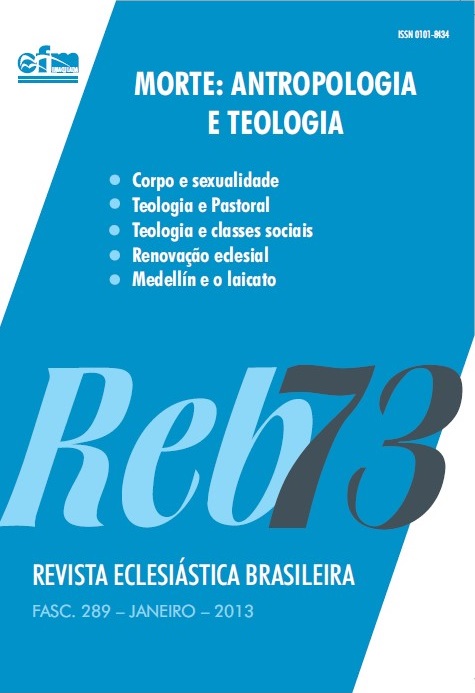O laicato na Conferência Episcopal Latino-Americana de Medellín (1968)
DOI:
https://doi.org/10.29386/reb.v73i289.687Schlagworte:
Episcopado latino-americano, Conferência de Medellín, laicato.Abstract
Este artigo estuda a interpretação do Magistério Eclesiástico da Igreja Católica sobre o laicato na Segunda Conferência Episcopal Latino-Americana, realizada em Medellín (Colômbia), no ano de 1968. Nessa Conferência ocorreu uma tentativa de sistematizar e definir o papel do laicato na Igreja e na sociedade, retomando as intuições do Concílio Vaticano II (1962-1965) e a visão do Magistério Eclesiástico latino-americano. A proposta é, portanto, oferecer uma visão sincrônica e diacrônica da temática, com foco no documento conclusivo da Conferência de Medellín, no que diz respeito à questão do laicato, considerando ainda as implicações históricas posteriores à realização da Conferência, principalmente na XIV Assembleia do CELAM, realizada em Sucre, na Bolívia, no ano de 1972. Assim, o objetivo é demonstrar, numa perspectiva crítica e sistemática, que o leigo na concepção do Magistério Eclesiástico latino-americano teve uma evolução histórica e doutrinal, sempre com muitos desafios e fragilidades, mas, ao mesmo tempo, com esperanças e possibilidades. A Igreja Católica na América Latina, desde a realização do Concílio Vaticano II, vivência um contexto histórico e doutrinal de ambiguidades e contradições, sem perder o ideal cristão, que se pauta numa sociedade justa, solidária e comprometida com a opção pelos pobres. O leigo é chamado a ter consciência dessa realidade e a assumir sua responsabilidade diante dos desafios presentes na própria estrutura da Igreja, assim como na relação com a sociedade. Nesse contexto eclesial e social, não se pode negligenciar a importância da Conferência de Medellín, devido à sua contribuição doutrinal e pastoral sobre o laicato, que será posteriormente retomada nos documentos conclusivos das Conferências Episcopais latino-americanas de Puebla (1979), Santo Domingo (1992) e Aparecida (2007).
Abstract: This article studies the understanding of the Ecclesiastical Magisterium of the Catholic Church about the laity in the second Latin American Episcopal Conference held in Medellin, Colombia, in 1968. At that conference there was an attempt to systematize and define the role of the laity inside the Church and society, resuming the intuitions of the Second Vatican Council (1962-1965) and the view of the Latin American Ecclesiastical Magisterium. So, the proposal is to offer a diachronic and synchronic view about the theme, having the focus on the conclusive document of the Medellin Conference referring the laity issue. It’s also necessary to take in account the Conference subsequent historical entailments, especially at the XIV CELAM Assembly, held in Sucre, Bolivia, in 1972. Therefore, the aimis to demonstrate, in a critical and systematic perspective, that the layman has had a historical and doctrinal development in the Latin American Ecclesiastical Magisterium view, always with many challenges and fragilities, but also with hopes and possibilities at the same time. The Catholic Church in Latin America has experienced a historical and doctrinal context of ambiguities and contradictions since the Second Vatican Council, without losing the Christian ideal that is based on a fair, supportive and committed society with the option for the poor. The laity is called to have consciousness about that reality and to accept his responsibility before the challenges present in the own Church structure and in the relationship with society as well. In this ecclesial and social context, we must not neglect the importance of the Medellin Conference, since it has a doctrinal and pastoral contribution to the laity, which will be resumed later in the conclusive documents of the Episcopal Latin American Conferences in Puebla (1979), Santo Domingo (1992) and Aparecida (2007).
Keyword: Latin American Bishops, Conference of Medellín, Laity
Downloads
Downloads
Veröffentlicht
Zitationsvorschlag
Ausgabe
Rubrik
Lizenz
Copyright (c) 2018 Revista Eclesiástica Brasileira

Dieses Werk steht unter der Lizenz Creative Commons Namensnennung 4.0 International.
Os autores cedem os direitos autorais; como gratificação, a REB oferece dois exemplares ao Autor de um artigo.
A REB adere à licença não comercial (Creative Commons). Portanto, é permitida cópia, distribuição e exibição dos textos, respeitados os direitos autorais e citada a fonte de sua proveniência.


